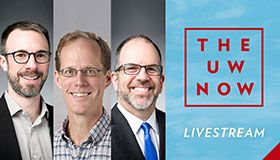Public discussion after the 2020 election, as President Donald Trump refused to accept results and launched dozens of lawsuits, has presented a picture of chaos. But, argues UW political science professor David Canon, “it really was an amazingly smooth election, given the circumstances.”
Those circumstances include a pandemic, the highest turnout in more than a century, and a sharp partisan divide. And yet election officials across the country managed to tabulate more than 150 million votes.
The 2020 Election and What's Next
Canon, along with political science colleagues Professor Barry Burden, director of the UW’s Elections Research Center, and Professor Kenneth Mayer, an expert in elections and campaign finance, spoke about the recent vote during The UW Now Livestream event on November 17.
Burden noted that, while removing a president after one term was unusual, many aspects of the campaign were unremarkable: even though turnout was so high, voting patterns showed the same trends that have been apparent over the previous 30 years. Joe Biden won, but by about 5 percent, within the range that has become common. “We are in a kind of era in which the margins between the parties are small,” Burden said.
Trump's Allegations
Canon discussed Trump’s efforts to overturn the election results and the prospect that those efforts will keep him in office. Trump has tried to allege fraud in court, to recount ballots to turn a loss into a win, and to convince state legislatures to set aside votes and appoint electors who will vote for him instead of Biden. None of these efforts has any likelihood of success. “There’s a zero percent chance that Trump is likely to win the presidency through the courts,” he said.
Mayer spoke even more emphatically about Trump’s stabs at overturning the election. “I’d describe them as laughable,” he said, “except for how harmful they are for democratic legitimacy.” He foresaw, however, that partisanship would continue, as legislatures around the country see a growing benefit of drawing district lines favorable to their party. “In states where state legislatures draw district lines,” he said, “they essentially have free rein to draw lines that are as biased as they can.”
Burden, Canon, and Mayer each gave a brief presentation and then took questions from the more than 500 viewers who followed the event live on YouTube. Mike Knetter, president and CEO of the Wisconsin Foundation and Alumni Association, hosted the conversation and served as moderator.
The three political scientists emphasized the success of the 2020 vote and the vital role that local officials played in creating such a smooth election. “It was a real tribute to our elections officials all around the country,” said Burden, “so if you know one of those individuals, thank them.”
To hear more from the speakers, view a recording of The UW Now. The next event will be December 1.
